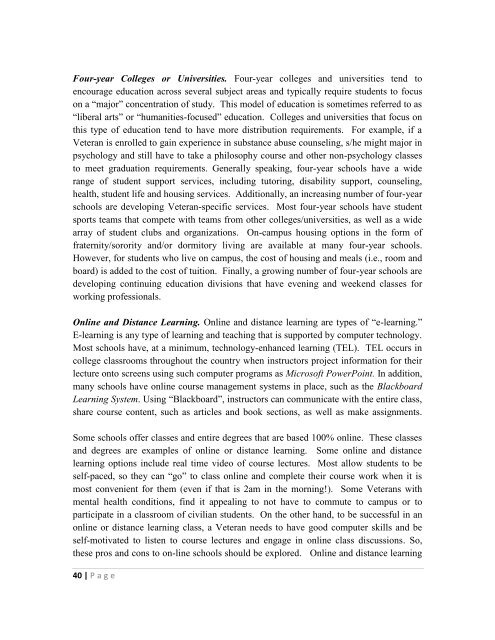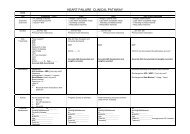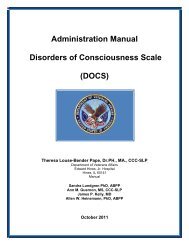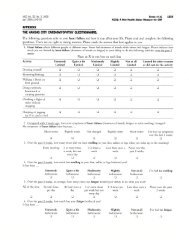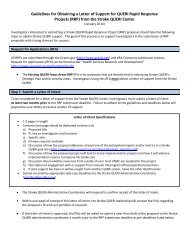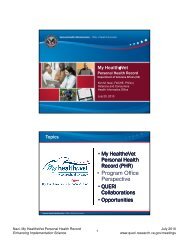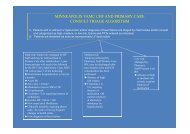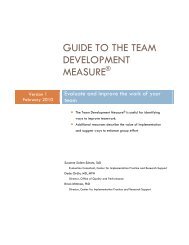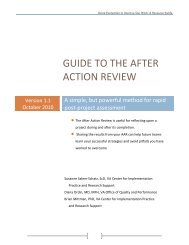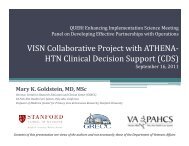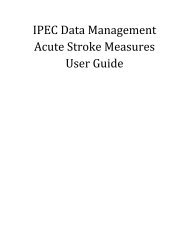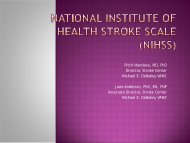The Veteran Supported Education Service Treatment Manual: VetSEd
The Veteran Supported Education Service Treatment Manual: VetSEd
The Veteran Supported Education Service Treatment Manual: VetSEd
Create successful ePaper yourself
Turn your PDF publications into a flip-book with our unique Google optimized e-Paper software.
Four-year Colleges or Universities. Four-year colleges and universities tend to<br />
encourage education across several subject areas and typically require students to focus<br />
on a ―major‖ concentration of study. This model of education is sometimes referred to as<br />
―liberal arts‖ or ―humanities-focused‖ education. Colleges and universities that focus on<br />
this type of education tend to have more distribution requirements. For example, if a<br />
<strong>Veteran</strong> is enrolled to gain experience in substance abuse counseling, s/he might major in<br />
psychology and still have to take a philosophy course and other non-psychology classes<br />
to meet graduation requirements. Generally speaking, four-year schools have a wide<br />
range of student support services, including tutoring, disability support, counseling,<br />
health, student life and housing services. Additionally, an increasing number of four-year<br />
schools are developing <strong>Veteran</strong>-specific services. Most four-year schools have student<br />
sports teams that compete with teams from other colleges/universities, as well as a wide<br />
array of student clubs and organizations. On-campus housing options in the form of<br />
fraternity/sorority and/or dormitory living are available at many four-year schools.<br />
However, for students who live on campus, the cost of housing and meals (i.e., room and<br />
board) is added to the cost of tuition. Finally, a growing number of four-year schools are<br />
developing continuing education divisions that have evening and weekend classes for<br />
working professionals.<br />
Online and Distance Learning. Online and distance learning are types of ―e-learning.‖<br />
E-learning is any type of learning and teaching that is supported by computer technology.<br />
Most schools have, at a minimum, technology-enhanced learning (TEL). TEL occurs in<br />
college classrooms throughout the country when instructors project information for their<br />
lecture onto screens using such computer programs as Microsoft PowerPoint. In addition,<br />
many schools have online course management systems in place, such as the Blackboard<br />
Learning System. Using ―Blackboard‖, instructors can communicate with the entire class,<br />
share course content, such as articles and book sections, as well as make assignments.<br />
Some schools offer classes and entire degrees that are based 100% online. <strong>The</strong>se classes<br />
and degrees are examples of online or distance learning. Some online and distance<br />
learning options include real time video of course lectures. Most allow students to be<br />
self-paced, so they can ―go‖ to class online and complete their course work when it is<br />
most convenient for them (even if that is 2am in the morning!). Some <strong>Veteran</strong>s with<br />
mental health conditions, find it appealing to not have to commute to campus or to<br />
participate in a classroom of civilian students. On the other hand, to be successful in an<br />
online or distance learning class, a <strong>Veteran</strong> needs to have good computer skills and be<br />
self-motivated to listen to course lectures and engage in online class discussions. So,<br />
these pros and cons to on-line schools should be explored. Online and distance learning<br />
40 | P a g e


